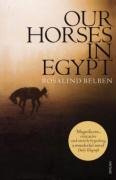 Our Horses in Egypt by Rosalind Belben
Our Horses in Egypt by Rosalind Belben
Vintage UK, London, 2008
I own this own. I wanted to join in with The Wolves during some of their monthly discussions about strange and challenging books. I had never heard of Rosalind Belben before seeing The Wolves booklist. My library didn’t carry any of her work so I bought a copy of Our Horses in Egypt online. Now I would like to read her other novels.
Our Horses in Egypt is an unusual book, it is based in fact and it shares the life and thoughts of a horse with human protagonists. The horse, Philomena, had been requisitioned by the British government during the First World War and served in Egypt and Palestine. After the war, 22,000 horses taken from Canada, Australia, the United States and British farms and estates were left in Egypt. When Griselda Romney, Philomena’s owner, decides to travel to Egypt to trace Philomena, she takes Amabel, her young daughter and her Nanny with her.
The novel’s chapters switch back and forth between the journey Griselda, Amabel and Nanny take, Philomena’s life in service to her government and Griselda’s search for her horse in Egypt. It took a while for me to begin to understand the dialog between Griselda and her friends and family as it is quick, sharp and filled with local dialect and expressions. Once I had a handle on it I found it funny and insightful, a bighting look at class in Britain during the early Twentieth century.
Neither Mrs Romney or Miss Lupus ever dreamt of setting foot in a public convenience. They would draw up the motor by a hotel, and march in. Unless there were clumps of gorse.
In a railway carriage, Mrs Romney and Miss Lupus “waited”. So too did Nanny. It behooved Nanny to school Amabel’s bladder. It would stand Amabel in such stead.
Nanny was conscious that she had been trained up, as a nursemaid, by the children’s nurse to a private household: and not properly. Mrs Romney hadn’t minded. Mrs Romney had never questioned Nanny’s superior knowledge of infants and the small’
Only once had Mrs Romney “said” something.
At her grandest, Mrs Romney had said, “The world is divided, Nanny, into those of it who lick a fingertip to turn a page and those of us do not.”
This had seared Nanny. From pages 52/53.
Then there are the horses, and the fact that the government had promised to ship them home after the war. There is much about how the horses were placed, cared for and sent into battle. Some soldiers had an understanding of horses and their needs, others did not. I do not know how Belben put herself inside Philomena’s head in order to tell of her experiences but I found the writing brilliant, the scenes of war appalling and the relationships that develop between Philomena, her soldiers and the other horses emotionally moving.
The horses had an uncomfortable time of it, held in a nullah, distracted by the whoomph and rumble of the guns. They were sheltered a little from each searing blast, but shells whined over their head, or exploded, in puffs of smoke, too loudly in front. Philomena knew the bay well: he trembled and shook and was so nervous he couldn’t break out a sweat. Coated in grit, like a miller’s in flour, his nose dripped. She lowered her head.
The horses would reach out with their whiskers, under fire, and touch each other with their breath. From page 133.Philomena watched as the first horse-ambulance, drawn by mules, with its passenger on his legs in the cart, his white face gloomily over the front bar, and a retinue of flies, halted for water before going on, to the rail-head, which in April had reached Deir el-Belah. Level ground helped. In a second ambulance, a gray mare not unlike Dalliance was strapped down flat, on her side; with a malevolent buzz in her wake.
Philomena didn’t grasp the significance. Instinct suggested a piercing neigh. She was silent.
To an animal that was interested (incurably) in all about her, there was much to bewilder her. From page 143.
I have to admit that by the end of this novel I cared more about the horses then the people and, as always, I am heart-broken at the pain and suffering we humans have managed to inflict on other beings. Rosalind Belben is careful not to pass judgment on those who care for these horses, the soldiers or the people of Egypt who end up owning them. She is clear-eyed in her presentation and this keeps the novel from falling into a sentimental miasma. She spent years reading about the war in Egypt and Palestine, about certain battles and about the horses. There is an excellent interview with her at Ready Steady Book.
I hated to remember but could not forget. Mrs Geoffrey Brooke
In an afterward Rosalind Belben writes about Mrs. Dorothy Brooke, the wife of a British Brigadier, who traveled to Egypt in 1930. Mrs Brooke saw the remaining war horses, saw their misery and was determined to end their suffering. She started the Old War Horse Memorial Hospital which has since become The Brooke, an organization that provides free veterinary care, training and education for those who work with horses, mules and donkeys. It is an organization worth supporting.


I have been wanting to read this one, too. My library doesn’t have a copy either, so I’ll have to look for it somewhere else!
Thanks for the email! I hope you enjoy the book.
I might have to look into this book eventually…
Our Horses in Egypt is unusual, I really enjoyed it.
So glad you liked this story, I loved it and thought it was well deserving of the
James Tait Black Memorial Prize in 2007. Everyone I know who’s read it has enjoyed it. Thanks for your thoughts on it.
I have to find out more about the James Tait Memorial Prize. I know nothing about it.
I guess Black Beauty comparisons are inevitable with a book that happens even partly from a horse’s point of view. I never went through the girl horse phase as a kid, but I did like Black Beauty, and this sounds cool in a lot of the same ways (sad, you know, but Black Beauty was too).
Yikes, I forgot about Black Beauty. It has been a long time since I read that one, maybe I should read it again. Our Horses in Egypt is sad and very well written.
I liked Our Horses in Egypt quite a bit, Gavin, but I thought the passages on Philomena and the war made the ones on Griselda quite boring in comparison for the most part. Glad you read along with us on this one and glad you bought a “strange and challenging” Wolves pick that you’re actually happy to own. Cheers!
Thanks, Richard. I found Belben’s style of writing quite fascinating. I had no knowledge of the James Tait Black prize books before this and want to read more from the list. I want to read along with several more of the Wolves picks and hope to have something vaguely intelligent to say about them.
So glad you liked this, Gavin! I too was impressed at Belben’s ability to write a balanced, moving story that at the same time avoided the “sentimental miasma,” particularly given her equine protagonists. Despite having a bit of trouble getting past the spikey writing style in the beginning, I ended up finding it affecting and humorous, and it gave me a lot to think about in terms of human/animal relationships. Thanks for reading along, and apologies for our delayed schedule!
Thanks for choosing “Our Horses”. Her writing is a bit “spikey” but I came to enjoy it after a while. I had no knowledge of the James Tait Black prize before this and want to read more from the list.
I was so impressed by how Belben got inside Philomena’s head, but never made you feel like she was fabricating things – all Philomena’s thoughts and feelings seemed genuine. Quite a feat. Thanks for reading along with us – your comments, as always, are excellent!
Agreed, Philomena’s thoughts do feel genuine. I think Belben really nailed it and would like to read more of her work.